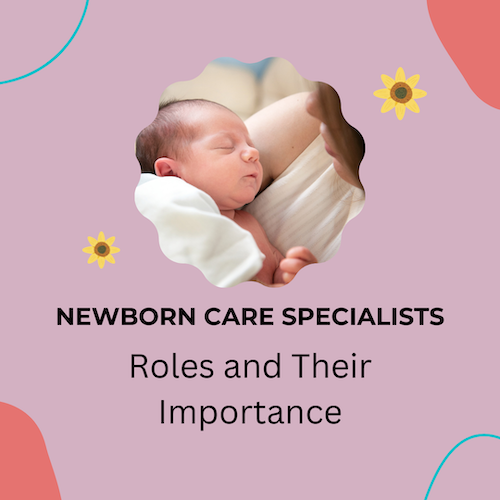Key Takeaways
• Newborn Care Specialists focus on post-birth baby care support.
• They provide feeding, sleep, and basic newborn care assistance.
• NCS professionals offer parental education and emotional support guidance.
Who are Newborn Care Specialists and how are they different from doulas?
A Newborn Care Specialist is a trained professional specializing in the care of newborns, usually up to three months old. Unlike a doula who might provide broad support before, during, and shortly after birth, an NCS focuses on post-birth care for the baby and supporting parents in the initial weeks at home. Newborn Care Specialists (NCS) are not qualified to offer medical advice, as they are not medical professionals. While they possess specialized training in newborn care and can provide guidance on general newborn needs, they cannot diagnose conditions, prescribe medications, or give advice on medical treatments.
Here are the key responsibilities of an NCS:
1. Feeding Support:
- Assisting with breastfeeding, including positioning, latch assistance, and troubleshooting common breastfeeding issues.
- Guiding parents on formula preparation and feeding if required.
- Monitoring feeding schedules and ensuring the baby is well-fed.
2. Sleep Routine Establishment:
- Assisting in setting a consistent sleep schedule for the baby.
- Educating parents on safe sleep practices.
- Offering guidance on sleep training methods when appropriate.
3. Daily Care Logs:
- Documenting daily activities such as feeding times, diaper changes, sleep patterns, and any other significant observations.
4. Infant Soothing Techniques:
- Utilizing various calming methods, such as swaddling, rocking, or white noise, to soothe a fussy baby.
5. Basic Newborn Care:
- Handling tasks like bathing, diapering, nail care, and burping.
- Observing and monitoring for common newborn skin conditions and advising parents accordingly.
6. Health and Wellness Monitoring:
- Observing for signs of common newborn illnesses or issues.
- Checking for signs of developmental milestones.
- Advising parents when to seek medical attention if concerning symptoms arise.
7. Parental Education and Support:
- Offering guidance on baby care basics.
- Answering any questions or concerns new parents might have.
- Offering emotional support, especially during the challenging early weeks.
8. Maintaining a Clean and Sanitary Environment:
- Sterilizing baby's feeding equipment, toys, and other essentials.
- Ensuring the baby's environment, such as the nursery, is clean and safe.
7. Night Duty Care (for those offering overnight services):
- Taking care of the baby's needs throughout the night, allowing parents to get rest.
- Addressing any nighttime feeding or soothing requirements.
8. Postpartum Support:
- Identifying signs of postpartum depression or anxiety in mothers.
- Offering resources or referrals for additional help when needed.
9. Collaboration with Other Professionals:
- Coordinating with lactation consultants, pediatricians, or other specialists when necessary to ensure comprehensive care for the newborn.
What is the importance of Newborn Care Specialists?
Newborn Care Specialists (NCS) play a critical role in the early weeks and months of an infant's life. Their importance can be highlighted through the following points:
- Expert Care: NCSs have specialized training and expertise in newborn care, ensuring that the baby's immediate needs are met with the utmost professionalism and knowledge.
- Support for Parents: The initial weeks following childbirth can be overwhelming for parents. An NCS provides vital support, guidance, and reassurance, allowing parents to adjust to their new roles confidently.
- Sleep Assistance: One of the significant challenges new parents face is disrupted sleep. With many NCSs offering overnight services, parents can get some much-needed rest, knowing their baby is in capable hands.
- Feeding Guidance: Whether a mother chooses to breastfeed, formula-feed, or both, an NCS offers invaluable assistance, ensuring the baby is well-fed and addressing any feeding concerns promptly.
- Health Monitoring: NCSs are trained to observe and monitor newborns for any signs of illnesses or developmental concerns, providing an added layer of security for parents.
- Routine Establishment: One of the keys to smoother infant care is establishing a routine. NCSs help set consistent feeding, sleeping, and care schedules, laying the foundation for healthy habits.
- Parental Education: Beyond hands-on care, NCSs educate parents on various aspects of infant care, from bathing techniques to understanding infant cues, ensuring parents are better equipped to care for their babies independently over time.
- Emotional Support: Childbirth and the postpartum period can be emotionally challenging. NCSs provide emotional and psychological support, often identifying signs of postpartum challenges and offering guidance or referrals as needed.
- Support for Special Cases: In cases of premature births, multiples (twins, triplets, etc.), or babies with special needs, the expertise of an NCS can be particularly invaluable, helping parents navigate the unique challenges these situations present.
- Resource Referrals: An NCS is often well-connected within the childcare community and can refer parents to other specialists or resources, such as lactation consultants, pediatricians, or support groups, as necessary.
In Conclusion:
Welcoming a newborn is a beautiful journey filled with incredible moments and inevitable challenges. A Newborn Care Specialist is a beacon of support during these early days, providing expertise, reassurance, and hands-on help. For many families, their assistance proves invaluable, setting a positive tone for the baby's first months and fostering confident, informed parenting.
Looking for evidence based training which is reviewed by experts and offer a great value? Newmom.me Academy offers a great Dual Postpartum Doula + Newborn and Infant Care Specialist Certification which not only certifies you but also enables you to launch your business within weeks of completing your training.
At Newmom.me, we’re here to transform the motherhood narrative and make this process of finding support so much easier on you. We have a carefully curated, easy-to-use, and customizable platform where you can search by the type of service you need, location, and availability. You can easily sign up to review profiles of Lactation Consultants, Doulas, Mother’s helpers, and other services. Let us help you embrace motherhood with a full heart.





-9.png)
-8.png)
-7.png)